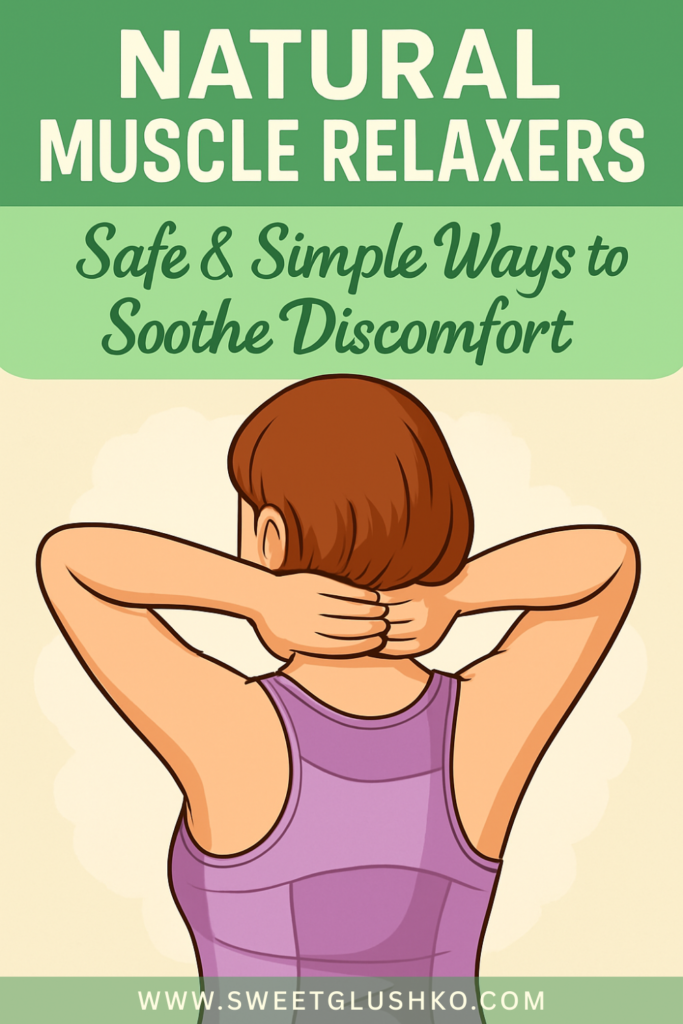A sedentary lifestyle and long work hours can lead to muscle aches and spasms. These issues can affect anyone, at any time, and in any part of the body. Instead of relying on painkillers, natural muscle relaxers or home remedies can help relieve sudden involuntary strain, tightness, or muscle bulging.
Certain natural remedies, such as herbal treatments, dietary adjustments, and relaxation techniques, can effectively reduce muscle tension and promote overall muscle health. Exploring these natural options may provide a safer and more holistic approach to managing muscle discomfort.

- What Causes Muscle Spasms?
- 7 Natural Muscle Relaxers for Pain Relief
- Other Ways to Reduce Muscle Spasms
What Causes Muscle Spasms?
Muscle spasms commonly affect the neck, shoulders, and back due to poor posture, but they can occur in any part of the body, including the hands, feet, calves, hamstrings, and abdomen. These spasms can limit movement and cause mild discomfort or intense pain.
Muscle spasms, cramps, and soreness can result from one or a combination of the following factors:
- Prolonged strenuous physical activity or heavy exercises
- Poor sitting posture during long work hours, leading to back, shoulder, or neck pain
- Incorrect sleep positions or improper walking posture
- Uterine contractions during menstruation
- Rapid weight gain and a sedentary lifestyle, which increase the risk of muscle stiffness and cramps
- Sudden twists, bumps, or falls
- Nutrient deficiencies, such as a lack of vitamin D, magnesium, or protein
- Chronic muscle pain caused by conditions like arthritis, fibromyalgia, or similar health conditions
- Rarely, certain chronic conditions like muscular dystrophy, multiple sclerosis, or McArdle’s disease may contribute to muscle spasms
While reaching for painkillers or OTC pain relief ointments might be the first instinct when dealing with muscle spasms, exploring alternative approaches can be beneficial. Natural muscle relaxers and home remedies for muscle tension may provide effective relief and promote long-term muscle health.
7 Natural Muscle Relaxers for Pain Relief
Muscle spasms and pain are common in today’s fast-paced lifestyle. However, relying on painkillers every time may not be the best approach. Natural muscle relaxers, including fruits, herbs, and essential oils, can provide relief by reducing stress and easing muscle soreness. Below are some of the most effective natural remedies and ways to incorporate them into your routine.
1. Chamomile
Chamomile is a powerful herbal muscle relaxer with anti-inflammatory flavonoids. It is known to help manage conditions such as muscle spasms, menstrual cramps, insomnia, hay fever, colds, and flu. Massaging chamomile essential oil onto affected muscles improves blood circulation and helps relieve spasms. Drinking chamomile tea may also help relax stiff and sore muscles due to its anti-inflammatory and antispasmodic properties.
2. Cherry Juice and Extracts
Cherries are packed with antioxidants and anti-inflammatory compounds that aid in muscle relaxation and reduce soreness. Studies suggest that tart cherry juice and extracts can help athletes and marathon runners recover from muscle sprains and injuries. Drinking cherry juice may also reduce muscle damage and promote faster recovery.
3. Blueberries
Blueberries contain high levels of antioxidants and anti-inflammatory polyphenols that aid muscle recovery after exercise. Including blueberries in your diet may enhance exercise performance and lower inflammation markers. A pre- or post-workout blueberry smoothie can help in faster recovery from muscle strain. Blueberries may also support muscle health in the elderly by easing chronic pain and improving mobility.
4. Cayenne Pepper
Cayenne pepper contains capsaicin, a natural muscle relaxant that may relieve pain caused by fibromyalgia and other muscle disorders. Capsaicin is found in cayenne pepper extracts, which are available in capsules and creams. Research suggests that applying capsaicin cream to affected muscles can help relieve spasms and soreness.
5. Pomegranate Juice
Pomegranate juice is another natural remedy for muscle soreness. Studies have found that consuming pomegranate juice can reduce muscle damage and aid recovery in weightlifters. Another study highlighted its benefits in increasing muscle strength and reducing soreness in the elbow flexor muscles.
6. Peppermint
Menthol, the primary compound in peppermint, is widely used in pain relief medications due to its analgesic and anti-inflammatory properties. Peppermint can be used in two ways:
- Peppermint Tea: Studies suggest that drinking peppermint tea infusions can relieve muscle pain and discomfort. Simply add a few mint leaves to boiling water to make a soothing tea.
- Peppermint Oil Massage: Topical application of peppermint oil has been found to provide a cooling effect, relieve pain, and promote muscle relaxation. However, peppermint oil may not be suitable for individuals with liver, bile duct, or gallbladder conditions.
7. Rosemary
Rosemary is known for its ability to relax muscles and ease joint pain. It is also highly effective in relieving menstrual cramps.
- Rosemary Bath: Soaking in a warm bath infused with rosemary leaves may help soothe sore muscles.
- Rosemary Essential Oil: Massaging diluted rosemary essential oil onto affected areas can relieve body aches and muscle tension.
Incorporating these natural muscle relaxers into your routine may help reduce muscle pain and promote overall well-being without the side effects of conventional painkillers.
Other Ways to Reduce Muscle Spasms
Take Rest
Proper rest, hydration, and allowing the affected muscle to recover can help alleviate muscle spasms. Overworked muscles are often the cause of spasms, so getting enough rest is crucial to prevent fatigue and long-term damage.
Massage
Massaging the affected area with the right pressure can help release tension and relax tight muscles. Massages can be done at home or with a licensed therapist at a spa or physiotherapy center. Deep tissue massage techniques are particularly effective for relieving muscle tightness and discomfort.
Use Warm or Cold Compresses
Applying heat or ice packs is a common and effective way to relieve muscle pain and soreness. Heat therapy improves blood circulation and helps muscles relax, while cold therapy reduces inflammation and swelling. Identifying the type of pain can help determine which method would be more beneficial.